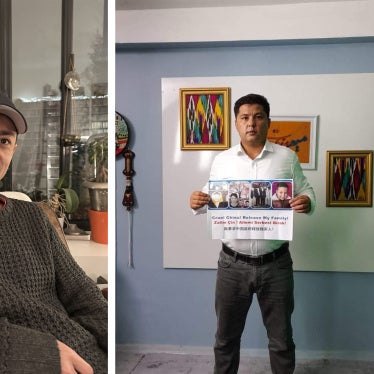Dear High Representative Mogherini,
We write on the occasion of your visit to Beijing on May 5-6. We urge that you express publicly and privately to senior Chinese leaders the European Union’s concerns about the deteriorating human rights environment.
In its strategic framework on human rights and democracy, the EU pledges that human rights, democracy, and rule of law will be promoted “in all areas of the EU's external actions without exception” and that the EU will “place human rights at the center of its relations with all third countries including strategic partners.”
As EU High Representative for Foreign Affairs and Security Policy, it is imperative that you make unambiguous the EU’s commitment to human rights by prioritizing them in your Beijing discussions. If you do not make clear the EU’s concerns, other EU interventions on human rights, such as those at the United Nations Human Rights Council or statements by your spokesperson, are unlikely to be given serious consideration by the Chinese government.
The EU has diverse goals in China, including a commitment to human rights promotion made at the highest levels. Yet none of those goals can be accomplished without the Chinese government tolerating a non-politicized judicial system, the free flow of information, and peaceful criticism. The concerns raised by the EU Chamber of Commerce in China revolve around the lack of rule of law, surveillance, and discrimination against foreign companies; efforts to combat terrorism are hindered by the Chinese government’s deeply politicized use of the security forces and legislation. Bilateral cooperation on issues ranging from product safety to environmental protection cannot progress if independent voices from China continue to be persecuted rather than welcomed into policy debates. It is unrealistic to expect a strategic dialogue to be effective unless it addresses the lack of respect for basic human rights.
Quite simply, European interests in China are best served by securing progress on human rights and the rule of law.
In this spirit, we urge that you:
- Mark the 40th anniversary of EU-China bilateral cooperation by explaining to your Chinese government counterparts the relationship between human rights protections in China and the overall strength of the EU-China relationship. Make clear that the two cannot cooperate more closely on bilateral initiatives when Chinese citizens who wish to peacefully argue for policy reforms are imprisoned. Stipulate that the long-term health of the bilateral relationship depends on the free flow of information, and the ability of the domestic and international press to report freely. Note that cooperation on international law enforcement or counter-terrorism efforts cannot be pursued until and unless China revises its laws and practices to conform with international standards that protect human rights.
- Publicly call for the release of or dropping of all charges against peaceful government critics, anti-corruption activists, lawyers, and journalists, including imprisoned 2009 Nobel Peace Prize winner Liu Xiaobo; five women’s rights activists—Li Tingting, Wei Tingting, Wang Man, Zheng Churan, and Wu Rongrong—detained on March 7-8 for their efforts to raise awareness about sexual harassment; and Uighur economist Ilham Tohti, now serving a life sentence on baseless charges of “separatism.” High-profile activists such as public intellectual Guo Yushan, lawyer Pu Zhiqiang, and legal activist Guo Feixiong, who have been detained for months despite the lack of credible evidence of any illegal activities, would also benefit from your publicly calling for their release.
- As a diplomatic and financial supporter of independent civil society in China, urge your interlocutors to withdraw the proposed Foreign Non-Governmental Organizations Administration Law, which will make it extremely difficult for foreign funders to support domestic groups. If approved, the Ministry of Public Security (not the Ministry of Civil Affairs) will now have the power to supervise and approve registration of foreign NGOs. That 'supervision' can entail entering the premises of a foreign NGO at any point, questioning its staff, and copying or seizing any document, are tactics more commonly reserved for a criminal investigation. Foreign NGOs will have to submit for approval annual work plans and funding allocations, and will be prohibited from engaging in a range of peaceful activities, from raising funds or accepting donations in-country, to recruiting volunteers or trying to recruit members 'directly or indirectly.'
- Make clear that the issues identified in the EU’s Item 4 statement at the March 2015 session of the UN Human Rights Council, including the crackdown on human rights defenders and the situations in Tibet and Xinjiang, will be topics of discussion at the EU-China Summit later this year; and
- Commit to finding ways to convey to public audiences in China and Europe the nature of these discussions; doing so creates essential transparency and helps demonstrate EU support to those struggling to protect their human rights in China.
We believe that such steps are essential to strengthening meaningful bilateral relations; a China that respects human rights is a fundamentally better diplomatic, economic, and strategic partner. The EU’s own credibility as a principled promoter of human rights is buttressed when it confronts powerful and intransigent governments.
Thank you for your attention and please do not hesitate to contact us for any additional information you may need.
Sincerely,
Lotte Leicht Sophie Richardson
EU Director China Director
Human Rights Watch Human Rights Watch







